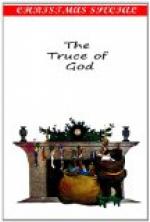This reassured her. It seemed to double the quality of mercy. She threw the door wide and the usurer went out cautiously, as if suspecting a trap. But patches of sunlight, barred with black, showed the way clear. He should have gone at once, but he waited to give her the blessing of his people. Even then, having started, he went back to her. She looked so small in that fearsome place.
“If there is something you wish, little maid, and I can secure it for you—”
“I wish but two things,” she said. “I wish to be a boy, only I fear it is too late for that. The Bishop thinks so. And I wish to see my mother.”
And these being beyond his gift, and not contained in the pack he had fastened to his shoulders, he only shook his head and took his cautious way toward freedom.
Having tried song and a good deed, Clotilde went back again to her room, stepping over the page, who had curled himself up in a ball, like a puppy, and still slept. She crossed her hands on her breast and raised her eyes as she had been taught.
“Now, O Lord,” she said, “I have tried song and I have tried a good deed. I wish to see my mother.”
Perhaps it was merely coincidence that the level rays of the morning sun just then fell on the crucifix that hung on the wall, and that although during all the year it seemed to be but of wood and with closed eyes, now it flashed as with life and the eyes were open.
“He was one of Your people,” she said to the crucifix, “and by now he is down the hill.”
[Illustration: Chapter Two]
II
Now it was the custom on the morning of the Holy day for the seigneur to ride his finest stallion to the top of the hill, where led a steep road down into the town. There he dismounted, surrounded by his people, guests and soldiers, smaller visiting nobility, the household of the Castle. And, the stage being set as it were, and the village waiting below, it was his pleasure to give his charger a great cut with the whip and send him galloping, unridden, down the hill. The horse was his who caught it.
Below waited the villagers, divided between terror and cupidity. Above waited the Castle folk. It was an amusing game for those who stood safely along the parapet and watched, one that convulsed them with merriment. Also, it improved the quality of those horses that grazed in the plain below.
This year it was a great grey that carried Charles out to the road that clung to the face of the cliff. Behind him on a donkey, reminder of the humble beast that had borne the Christ into Jerusalem, rode the Bishop. Saddled and bridled was the grey, with a fierce head and great shoulders, a strong beast for strong days.
The men-at-arms were drawn up in a double line, weapons at rest. From the place below rose a thin grey smoke where the fire kindled for the steer. But the crowd had deserted and now stood, eyes upraised to the Castle, and to the cliff road where waited boys and men ready for their desperate emprise, clad in such protection of leather as they could afford against the stallion’s hoofs.




